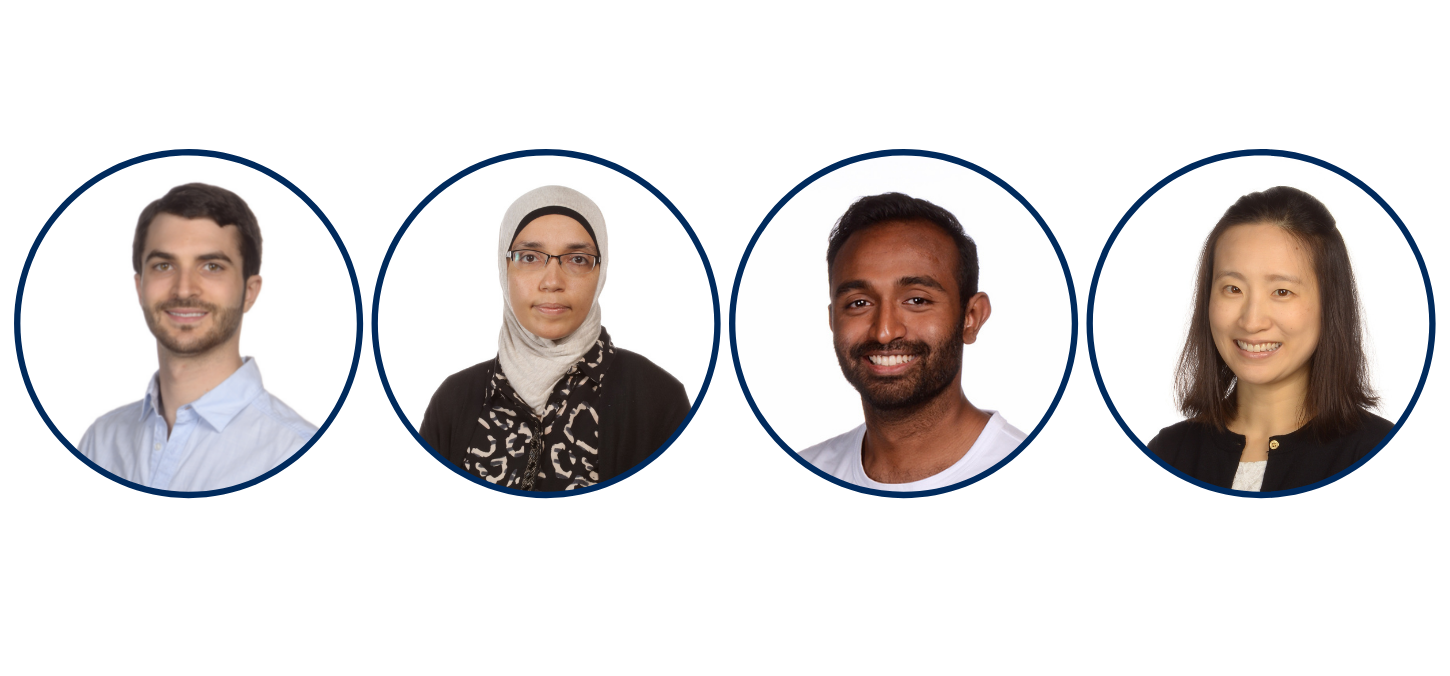
Specialty grads stay in school
By Diane Peters
Some of this year’s advanced degree graduates have secured jobs in academia
Many professionals attend graduate school to learn and further their expertise so they can excel in their field. But for some, their dream is to stay in academia to do research, teach and make a difference in pushing their specialty forward. Include Justin Bubola 2T1 MSc OP/OM as one such dreamer.
“I reached my goal. This was my goal,” says Bubola of his new position as a part-time assistant professor, teaching stream, in the Faculty of Dentistry. He’s balancing this job — which entails teaching pathology to undergraduates and graduates, plus he’ll take on some research projects in time — with a few days a week in private practice.
He’s well prepared for this varied schedule, after a four-year master’s in oral pathology and oral medicine that entailed a hospital residency, research and teaching. “It was a very intense program with so many facets to it,” he says.
The teaching time proved to be pivotal. “During the program I got a lot of exposure to teaching dental students and I really developed a passion for teaching,” says Bubola, who completed his DDS at Western University in 2014. In addition to writing his Canadian board and fellowship examinations, Bubola also successfully completed his American Board of Oral and Maxillofacial Pathology (ABOMP) and American Academy of Oral and Maxillofacial Pathology (AAOMP) examinations. Along with passing the AAOMP fellowship examination, he was awarded the Shafer award for achieving the highest score on the fellowship examination.
For at least one of this fall’s graduates, academic life was already mapped out well in advance. Hebatullah Hussein 2T1 PhD came to U of T in late 2016 on a competitive, government-sponsored scholarship from her native Egypt. She was funded to complete her PhD and then return to Ain Shams University in Cairo, where she’d completed her dental degree and her specialty master’s in endodontics, to take a job as a lecturer (an equivalent job to assistant professor).
Ain Shams University excels at clinical teaching, but its dental research program is not yet fully established. “Before I came here, doing cutting-edge, basic science research there was not feasible,” says Hussein. “I will go back and try to apply what I have learned here.”
Her work in professor Anil Kishen’s lab has entailed researching nanotechnology-based root canal materials and host-bacterial interactions.
“He’s like a coach,” she says of Kishen. “He inspires me in how I should be mentoring my own students later on.” She’s now completing a post-doc at U of T, and is expecting to head back to Egypt in a year.
Kishen has also worked with another of this fall’s graduates, Alice (Fang-Chi) Li 1T8 PhD, 2T1 MSc Endo. A trained dentist and endodontist from Taiwan, she came to Canada to do her PhD in 2014, and finished up a master’s in endodontics last fall. This second degree allowed her to practice as an endodontist in Canada. “To be well trained in both research and clinically helps me to be a well-rounded endodontist,” she says.
Li now divides her time between working as an associate at a practice in Toronto with a clinical instructor position at the Faculty, plus she’s also doing postdoctoral work in Kishen’s lab. She looks to Kishen to guide her teaching approach. “When I learn from him, I always think, oh, I didn’t know this could be so clear!” she says. “He’s just born to be a teacher.”
Research-wise, during Li’s PhD, she focused on using bioengineered nanoparticles for enhancing the root dentin in root-canal treated teeth, but she pivoted to looking at inflammation and wound healing on the cellular level. “It feels like I’ve broadened my skills into another aspects of research,” she says.
But one new faculty member at U of T Dentistry came into his master’s in pediatrics with no plans for a future in academia. “I’d worked with kids my entire life,” says Nashat Cassim 1T7, 2T1 MSc Pedo. He did his DDS at U of T, and a one-week rotation at SickKids during his DDS4 solidified his plans for becoming a pediatric dentist. He then completed a one-year residency at SickKids and right after, started his master’s.
The only aspect of the degree that didn’t initially appeal to Cassim was doing research — his previous time in a lab didn’t resonate. But his research project looking at dental students and their experiences treating patients with developmental disabilities (which are under the purview of pediatric dentistry) changed that.
“I didn’t know I was interested in research until I started doing research that interested me,” says Cassim. “I also realized I’m passionate about education.” His newly begun part-time position as an assistant professor in the teaching stream at the Faculty allows him to work closely with students, plus do research that focuses on dental education.
Cassim now has a busy schedule that includes teaching two days a week, working in private practice two days a week and serving as a staff dentist at Holland Bloorview Kids Rehabilitation Hospital one day.
He’s not alone among these new grads who are blending teaching, clinical instruction, research and working in private practice into their new lives as still-establishing-themselves academics. Says Cassim of his own quest to juggle patient care, education projects, research and keeping up on the academic literature in his field: “You’re a better clinician if you have a solid foundation of what’s new. When you have that foot in the academic space, it makes you a more informed practitioner.”
Photo: (from left to right) Justin Bubola, Hebatullah Hussein, Alice (Fang-Chi) Li and Nashat Cassim (Jeff Comber)